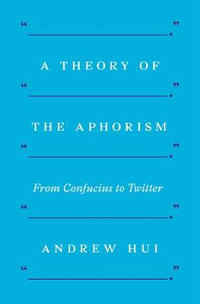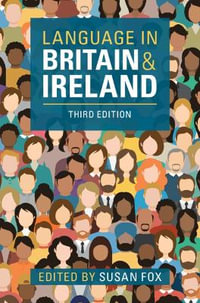When did English become American? What distinctive qualities made it American? What role have America's democratizing impulses, and its vibrantly heterogeneous speakers, played in shaping our language and separating it from the mother tongue?
A wide-ranging account of American English, Richard Bailey's Speaking American investigates the history and continuing evolution of our language from the sixteenth century to the present. The book is organized in half-century segments around influential centers: Chesapeake Bay (1600-1650), Boston (1650-1700), Charleston (1700-1750), Philadelphia (1750-1800), New Orleans (1800-1850), New York (1850-1900), Chicago (1900-1950), Los Angeles (1950-2000), and Cyberspace (2000-present). Each of these places has added new words, new inflections, new ways of speaking to the elusive, boisterous, ever-changing linguistic experiment that is American English. Freed from British constraints of unity and propriety, swept up in rapid social change, restless movement, and a thirst for innovation, Americans have always been eager to invent new words, from earthy frontier expressions like "catawampously" (vigorously) and "bung-nipper" (pickpocket), to West African words introduced by slaves such as
"goober" (peanut) and "gumbo" (okra), to urban slang such as "tagging" (spraying graffiti) and "crew" (gang). Throughout, Bailey focuses on how people speak and how speakers change the language. The book is filled with transcripts of arresting voices, precisely situated in time and space: two justices of the peace sitting in a pumpkin patch trying an Indian for theft; a crowd of Africans lounging on the waterfront in Philadelphia discussing the newly independent nation in their home languages; a Chicago gangster complaining that his pocket had been picked; Valley Girls chattering; Crips and Bloods negotiating their gang identities in LA; and more.
Speaking American explores--and celebrates--the endless variety and remarkable inventiveness that have always been at the heart of American English.
Industry Reviews
"The story of American English is one of eternal rises and falls in reputation, and Bailey, the author of several books on English, traces our assorted ways of speaking across the country, concentrating on a 50-year period, starting in Chesapeake Bay and ending in Los Angeles." -- The New York Times Book Review
"Places fresh daggers in the heart of the idea that language can somehow be perfected and standardized and celebrates the ability of English to change, adapt, adopt, steal and transform. - Kirkus Reviews
"Fascinating...Grounding this historical journey in specific cities allows Bailey to infuse his narrative of American English with local color." --Ben Zimmer, The Boston Globe
"Bailey's tour of the tongue includes enough colorful language-related anecdotes and enough cultural and historical meat to reward the patient general reader." --Chris Tucker, The Dallas Morning News
"Speaking American is a brilliant kaleidoscopic picture of American English, showing deftly and authoritatively that Americans have always invented and re-invented our language as we please (and in every American place, from sea to shining sea)." --Erin McKean, Founder, Wordnik.com
"Beautifully researched and engagingly written, Speaking American breaks new ground in showing, city by city, the complex human forces that have given American English its individual character and vitality. It will become required reading for anyone interested in the history of English." --David Crystal, author of The Cambridge Encyclopedia of the English Language and The Stories of English
"Speaking American is a rich look at the mind-blowingly diverse forces that have twisted and tweaked English on these shores." --Mark Peters, Visual Thesaurus
"Bailey successfully provides a history of American English through the eight cities described, and anyone with an interest in language, history, and/or American society will be able to read and enjoy the book." --LINGUIST
























